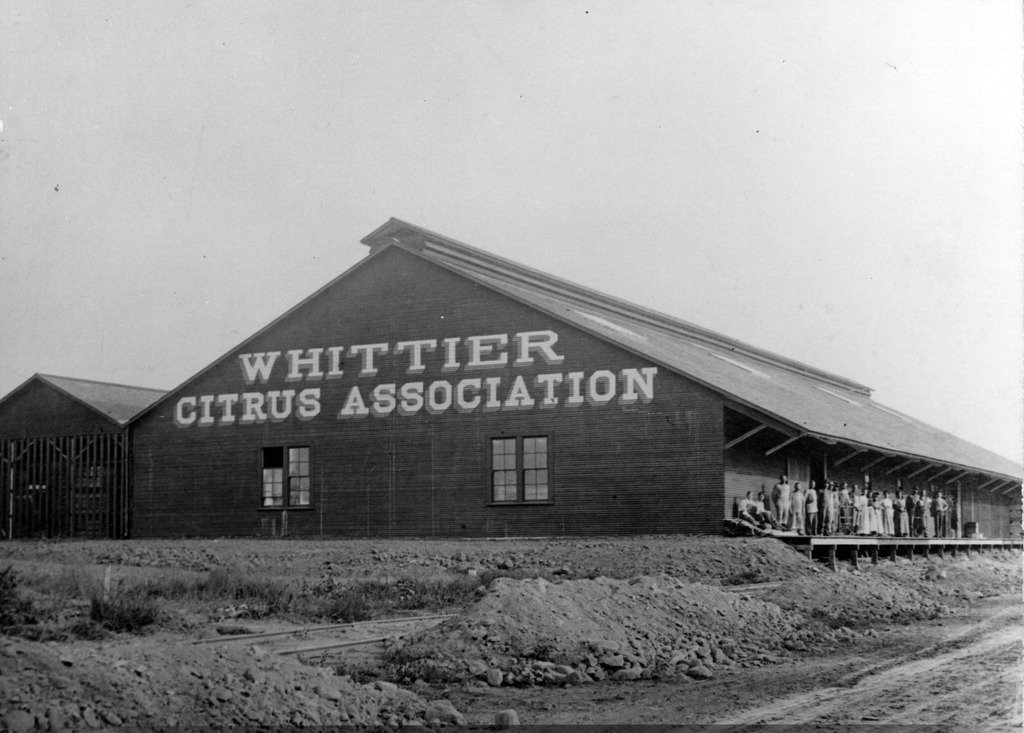Please join us for a webinar with our 2022 LACHS Scholarship recipients from Cal State Los Angeles. The students will present their essays followed by a Q&A session. The webinar will also be recorded and published on our website.
Both essays are available for download here: lacityhistory.org/scholarship
7:00 pm
It’s Complicated: Cross Purpose Politics and Reassessing Community in New Deal Era Whittier - Christopher Empett
Whittier Citrus Association, early 20th century. Photo: Whittier Public Library Historical Photograph Collection
The complex intersection of economic, political, social, and cultural change during the New Deal era offers abundant avenues of historical inquiry that historians have been eager to pursue. However, the same complexity that makes studying this period of dramatic and multi-faceted change fascinating and important has resulted in scholarship that tends to narrowly focus on big questions and big ideas. Did the New Deal save capitalism or devastate it? Were the roots of modern American conservatism planted in Californian workers’ confrontation with capital during the 1930s? How did conservative anxieties about Soviet Communism shape modern conservatism? These topics merit attention but risk conveying a reductive impression of the 1930s in which Americans aligned with liberalism or conservatism based on inherent pro-Communist or pro-capitalist loyalties and connect internationalism to liberalism. This approach often overlooks the perspective of social groups witnessing the central debate. Conflicts between striking workers and factory owners are certainly integral to understanding labor history, but what about the teachers, shopkeepers, preachers, or students who also hold stakes in a community yet aren’t direct participants in a confrontation? These histories tell us much about the voices shouting from the pulpits, but less about the people leaning forward to hear the message. Neglecting these indirect historical actors presumes they exerted no influence over the central actors, although we can see evidence that their opinions were important – otherwise why would capital demonize labor organizers as ‘Un-American’, for example? This study will depart from the tendency of New Deal Historians to focus on singular questions and big ideas. Closely examining a specific community reveals that political ideology can be an outcome of how a community perceives and resolves its problems, not the cause. Using the community of Whittier, California as a case study. Focusing on a narrow geography allows room to consider the complexities of political discourse across multiple community issues.
7:30 pm
Shared Experiences and Regional Kinship Webs: Mid-Twentieth Century New Mexico, México, and Los Angeles - Jerry Sisneros
After the 1848 Treaty of Guadalupe Hidalgo, the U.S.-Mexico border crossed sixty-thousand nuevomexicanos that had to make a difficult decision. They could remain on their family’s land, become United States citizens, and risk the possibility of violent expulsion like the tejanos, or they could leave their homes and repatriate to farmland in Chihuahua offered by the Mexican government. Their descendants’ collective memory, shaped by historiography, is that attitudes and identities drifted apart on both sides of the border with U.S. acculturation and the Mexican Revolution. A century later, a generation of young adults migrated from rural New Mexico and México to the post-war industrial boom underway in Los Angeles. This article examines the Latino migrant narrative and contributes an alternate path to broaden the Latino experience by acknowledging the role of migrant U.S. citizens in a transnational kinship network. In mid-twentieth-century Los Angeles, migrants from New Mexico and México had a complex relationship but were united by shared experiences as wage laborers and intertwined kinship networks.
Histories are selective, and this work aims to recover silenced Latino migrant voices to fill a gap in existing historical scholarship. The paper examines the reductive myth that Latino Los Angeles is an immigrant-only story. This discourse positions Latinos weakly as the beneficiaries of immigration instead of recognizing their rights on land they have lived on for centuries. Three dimensions of shared experiences are examined to intentionally break down myths that make distinctions between nuevomexicanos, Mexican immigrants, and their Mexican American children: neighborhoods, employment, and social life. The layered methodology includes a top-down demographic analysis of census data and a bottom-up approach to add voices and lives to the historical record using newspapers and oral interviews.
LOCATION
Webinar via Zoom
REGISTRATION
This is a free event but registration is required.
If you have questions about the event, please email us at lacityhistoryevents@gmail.com.
About the LACHS Scholarship Program
In 2019, the Los Angeles City Historical Society implemented a program to award scholarships to outstanding history graduate students at local universities and colleges. We hope that LACHS members and friends wish to support the program by donating funds to the program. Please note that 100% of all donations will go to students.
The Board recognizes the critical value of the study and analysis of history to our democracy and seeks to encourage outstanding students in the field.
For more information about the LACHS Scholarship Program and to read the students’ essays, please visit lacityhistory.org/scholarship





